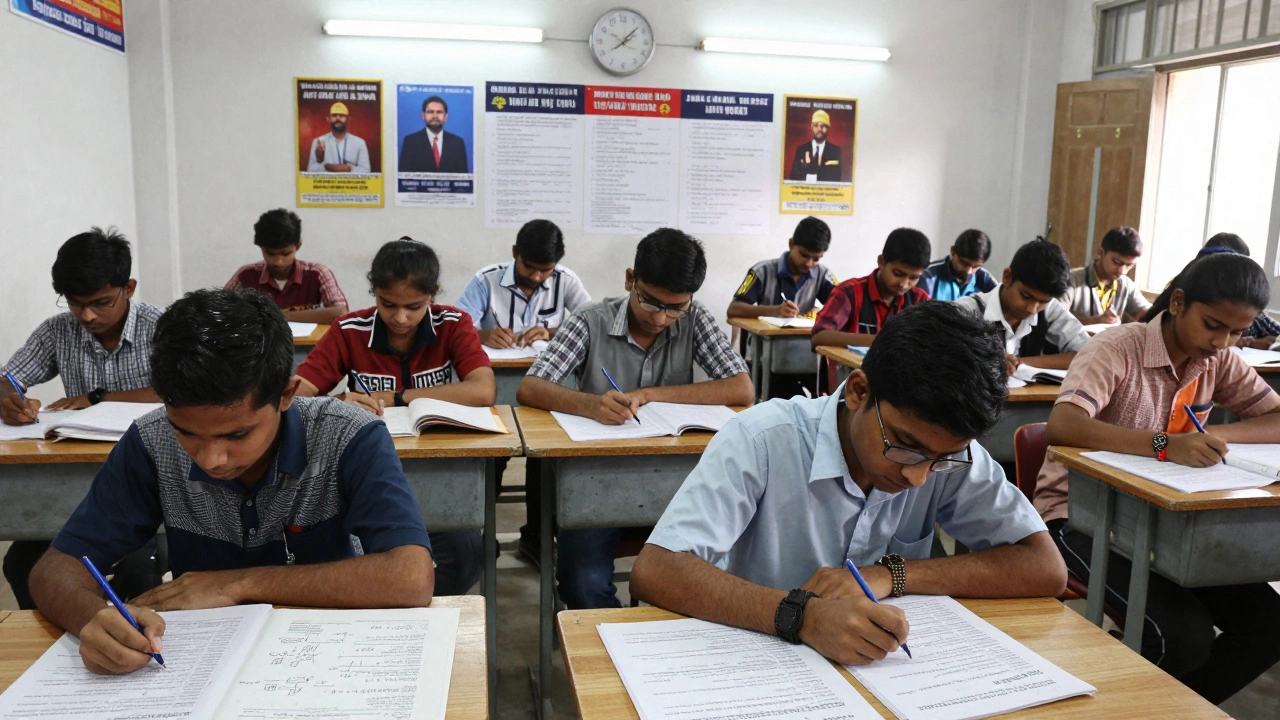Are Exams Easier in the UK or USA? CBSE Syllabus Comparisons That Matter

Every student, at some point, hears that dreaded question: are the exams harder in the UK, or do American tests leave you sweating more? If you’re from a CBSE background, this matter gets even trickier—you’re not just worried about moving countries, but also about how your study habits will fit in with new ways of testing.
The differences are real. UK schools use a lot of final exams, most of them at the end of two-year courses, and your grade often hangs completely on that last paper. In the USA, you mostly face smaller tests along the way—lots of quizzes, a few big finals, but also homework and projects that count toward your overall score. Sounds less scary? Well, it depends on your learning style.
If you’re thinking of moving, or just want to understand what your cousins abroad are going through, it pays to know these systems inside out. There’s no single answer, but the details will help you figure out where you’d thrive—and what surprises you might face.
- Breaking Down the Basics: UK vs USA Exams
- Grading Styles and Scores: What’s Tougher?
- CBSE Students Abroad: What Changes?
- Tips for Transitioning: How to Stay Ahead
Breaking Down the Basics: UK vs USA Exams
Let’s get straight to it—the UK and USA run completely different exam systems. If you’ve only known the CBSE style, stepping into either world can feel like switching games with different rules.
In the UK exams scene, students usually follow either GCSEs (at age 16) or A-Levels (at age 18). The real kicker? Most of your grade rides on end-of-year or end-of-course written exams. There’s a bit of coursework, but not as much as you find in American schools. If you bomb your final, that’s mostly it, and there’s little room to make up for it later. Subjects get compartmentalized early on—students pick a smaller number of subjects to specialize in for A-Levels. So, a 17-year-old in London might be prepping only three subjects for months, taking detailed exams in each.
Flip over to the USA, and things look more spread out. High schoolers face regular tests, pop quizzes, and projects—from math to history to science—all through the year. Your final grade is usually a mix of smaller tests, class participation, homework, and one or two big exams at the end. Students don’t typically specialize until college, so you keep studying a broad mix of subjects all through high school. AP (Advanced Placement) exams are the closest thing to a UK-style final, but you only take them if you want extra credit or college readiness. Most high schools care just as much about that essay you wrote in October as the final you take in June.
Here’s a simple way to see it:
- UK: Heavy focus on end-of-year exams, fewer subjects, high pressure on finals.
- USA: Grades build up over the year, more subjects, tests come in all shapes and sizes.
A former British headteacher put it well:
"UK exams push you to save your best for the big day, but in the US, every day counts for something."
So, if you’re used to CBSE—where a lot rides on major board exams—the UK method might actually feel familiar, but with fewer subjects and even more weight on the final showdown. In the USA, you’ve got more chances to fix a bad score, but you’ll have to juggle way more assignments and stay on your toes the whole year.
Grading Styles and Scores: What’s Tougher?
The real differences show up fast when you look at how UK and USA schools hand out grades. In the UK, exam boards use clear grade bands—like 9 to 1 for GCSEs and A* to E for A-levels. Your main shot at a top grade comes down to a few final UK exams. Mess up on a big test? There isn’t much homework or project work to boost your score, so the pressure is huge.
Now, flip to the USA. Here, you usually get letter grades—think A, B, C, and so on—with the famous 4.0 GPA system. But the catch? Your grade often comes from several slices: end-of-term tests, midterms, regular assignments, pop quizzes, and even class participation. It’s more of a marathon—consistent effort helps you rack up points over the year, and one bad test won’t sink your average.
For students used to the CBSE board, both these systems throw curveballs. CBSE tests can look a bit like UK ones: mostly written exams, big focus on final results. But the questions are usually more direct. UK exams can get tricky—they like ‘application’ and ‘analysis’ questions that force you to think, not just recall. USA tests can feel lighter, but there’s a steady work demand, tons of regular assignments, and open-ended questions where teachers expect original thinking.
So, which is actually tougher? If you struggle with cramming for a single big day, you might find UK or CBSE systems harsher. But if you hate daily homework or worry about slipping up all year long, USA grading can be exhausting. It’s about knowing your strengths. The main thing: in both places, understanding the marking rules helps you plan better and dodge nasty surprises.
- UK: High stakes, few chances, lots of pressure on finals.
- USA: Steady pace, more ways to earn marks, but always something due.
- CBSE: Similar to UK with its heavy focus on exams, but typically more predictable questions.
Whichever route you go, get to know the grading style fast. It makes a difference between feeling lost and actually winning at your new school.

CBSE Students Abroad: What Changes?
Landing in a UK or US classroom straight out of the CBSE system is like jumping into cold water—no two ways about it. The first thing CBSE students notice is how the pace and priorities shift. UK schools, especially at the GCSE and A-level stages, focus more on building up to one big shot: the end-of-year exam. You get less daily homework (which sounds great at first), but every lesson is aimed at that final paper. Miss something early, and it might trip you up later.
American schools, on the other hand, scatter the pressure. Here, students get lots of assignments and bite-sized assessments. Your final grade is a mix: tests, projects, class discussions, and yes, even attendance in some places. Compared to UK exams, this setup means you can recover from a bad test or two without your whole year crashing down.
Here's a quick breakdown of what CBSE students usually face when they move:
- Subject Choices: US and UK students pick fewer subjects for upper grades, unlike CBSE, where workloads lean heavier and broader.
- Assessment Style: The shift from Indian style direct-answer questions (give facts!) to application-focused or essay-based questions in the UK and US can throw you off at first.
- Participation Scores: In the US especially, talking in class actually boosts your marks—no more memorizing quietly at the back.
- Freedom with Projects: Group projects and presentations pop up everywhere in American schools, which can be intimidating if you’re used to more textbook work.
It’s not just about tests or marks. Even your routine gets shaken up. For example, in some US states, you need to show up for sports or arts to graduate—CBSE folks usually have no such rule.
Here’s some basic data that shows how grades and testing differ:
| System | Main Tests | Grading Basis |
|---|---|---|
| CBSE | Board Exams (fixed subjects) | Year-end tests: 80%, project/internal: 20% |
| UK (GCSE/A-level) | GCSEs, A-levels | End-of-course exam: up to 100% |
| USA (High School) | Finals, SAT/ACT (for college) | Assignments/tests/projects: 70-90%, finals: 10-30% |
The truth is, CBSE students aren’t behind—they just need to tweak their study style. Here’s a small tip: practice open-ended and reasoning questions before you move. It’ll help a lot when teachers abroad ask you for your opinion instead of just the right answer from the textbook.
Tips for Transitioning: How to Stay Ahead
Switching school systems can mess with your head, but it doesn’t have to wreck your grades. The trick is to know what you’ll face—and be ready for it before you even walk into class.
If you’re moving from CBSE to the UK, be prepared for a heavier push on independent study. UK teachers often tell you what to cover, but they don’t walk you through every detail in class. Mock exams are seriously important there—students use them to figure out weak spots, months before the real thing. Your grade mostly comes from one end-of-course exam, so get used to long revision periods and making your own notes.
For the USA, you’ll probably see more regular exams and quizzes, and your homework actually impacts your final marks. Some schools use open-book tests or let you bring a cheat sheet—a real curveball if you’re used to memorizing everything. Participation in class counts more, so don’t sit quiet. If you miss things, most teachers let you retake quizzes or redo assignments, so use those second chances if you need them.
The real win is planning ahead. Try this:
- Set up a study schedule that matches the local calendar—don’t just cram before big exams.
- Talk to classmates who’ve made the switch before. They know the hacks and how to impress new teachers.
- Use education apps or YouTube channels that fit your new curriculum. US and UK textbooks look different from CBSE, so spot the gaps early.
- Ask for past papers or example assignments as soon as you can. Practicing with the real thing makes the test feel a lot less scary.
If things go sideways, don’t panic. Both systems have plenty of support—tutors, mentors, and online forums are everywhere, and teachers are used to helping new students get up to speed. The main thing? Don’t wait until you’re already struggling. Reach out early, keep up with assignments, and you’ll do just fine.

